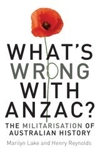 Professor Marilyn Lake. Co-author with Henry Reynolds, Mark McKenna and Joy Damousi of What’s Wrong with Anzac? The Militarization of Australian History, UNSW Press, 2010.
Professor Marilyn Lake. Co-author with Henry Reynolds, Mark McKenna and Joy Damousi of What’s Wrong with Anzac? The Militarization of Australian History, UNSW Press, 2010.
What did our Diggers Fight For? Marilyn Lake
Any answer to this question must rest on historical knowledge – and evidence – not individual opinion or national mythology. To answer this question requires extensive historical research which despite the avalanche of military history – of battles and battalions – is largely still to be done.
An answer to this question must also recognise the differences between the reasons for wars such as the Boer (or South African) War, World Wars 1 and 2, Vietnam, Iraq and Afghanistan and between the Allies, whom we went to support – British at the beginning and later American. Did the British Empire represent a different sort of liberty than the United States republic?
And it must recognise that the reasons men (and Diggers have been mostly men) chose to enlist may not be the same as the reasons offered by authorities when they called for soldiers to serve overseas. For example, many who enlisted in World War 1 did so because they sought adventure, they wanted to escape family difficulties, they thought it was the manly thing to do, because they had lost their job, received a white feather in the mail or because they were British born and wanted to return home and serve their country. A disproportionate number who enlisted to serve in World War 1 in the early months were British born.
If recruits invoked higher causes they often conceptualised these as serving King and Empire. Australian War Memorials scattered throughout the countryside, dedicated to the men who served in World War 1, do not usually mention freedom and democracy as their cause, but rather King and Empire. Many who enlisted in 1914 and early 1915 did not expect to be fighting the Turks in the Middle East, but the Germans in Europe, who had invaded Little Belgium. Diggers went to fight the Hun. The Allied Forces invaded Turkey to assist their ally, autocratic Csarist Russia. Was this fighting for democracy?
If Australian soldiers were fighting to defend freedom and democracy in World Wars 1 and 2 these meant very different things in Australia and the United Kingdom. By 1914, Australia had established an advanced pioneering democracy built on the lines of social equality, that enshrined equal rights for men and women, the 8 hour day and minimum wages, industrial arbitration to secure social justice and peace between capital and labour, old age and invalid pensions, payment to members of parliament and free, compulsory and secular education. These reforms were won in Australia by political and social activists not by soldiers. Manhood and womanhood suffrage were still but dreams in Britain in 1914 when its soldiers went – and were later sent – to fight Germany.
None of the early Australian radical liberal or labour leaders – Alfred Deakin, HB Higgins, Vida Goldstein, Andrew Fisher, WM Hughes – had served as soldiers. Their values were not formed in warfare, they did not arise from military experience. Neither John Curtin nor Robert Menzies had served in World War 1 as their political enemies would later note. The distinctive Australian democracy – and the Australian nation – were built up during a very long period of peace in which women came to the fore as political actors.
Overseas commentators thought that Australian democratic achievement was distinctive and path-breaking. US leader Carrie Chapman Catt said that 1903, the year in which Australian women first voted and stood for election to the national parliament – a world-historic first – would go down in history with 1776 as milestones in the history of democracy. Australia had become the most democratic country on earth. Why isn’t this democratic milestone and those who battled to achieve it commemorated today even in our own country?

